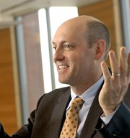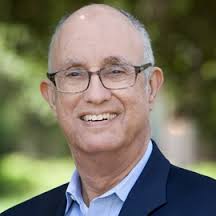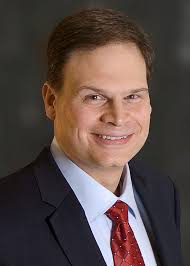Contributor: Jacob Adler
Work and Life is a radio program hosted by Stew Friedman, director of the Wharton Work/Life Integration Project, on Sirius XM’s Channel 111, Business Radio Powered by Wharton. Every Tuesday at 7 pm EST, Stew speaks with everyday people and the world’s leading experts about creating harmony among work, home, community, and the private self (mind, body, and spirit).
Scott Barry Kaufman is Scientific Director of the Science of Imagination Project at the Positive Psychology Center at The University of Pennsylvania. The research is supported by a research grant from the Imagination Institute. He conducts research on the measurement and development of imagination, creativity, and play, and teaches the popular undergraduate course Introduction to Positive Psychology. Kaufman is author of Ungifted: Intelligence Redefined and co-author of the upcoming book Wired to Create: Unraveling the Mysteries of the Creative Mind (with Carolyn Gregoire). He is also host of The Psychology Podcast, co-founder of The Creativity Post, and he writes the blog Beautiful Minds for Scientific American. Kaufman completed his doctorate in cognitive psychology from Yale University in 2009 and received his master’s degree in experimental psychology from Cambridge University in 2005, where he was a Gates Cambridge Scholar.
The following are edited excerpts of their conversation.
Stewart Friedman: What led you here?
Scott Barry Kaufman: I think my whole life, especially as young as I can remember, I was really interested in human possibility and what people are capable of achieving in life. I felt personally like I was being held back. The first three years of my life I suffered from something called Central Auditory Processing Disorder, it’s a learning disability that made it very hard for me to process things in real time. I was placed in special education as a result, and I remember sitting there in special ed and I have memories as-young-as-can-be just sitting there and daydreaming, looking out the window, just thinking is there more that I’m capable of doing. Talking to my friends in special ed, all of us wondered if we could bypass these expectations or if we were prisoners of these expectations.
SF: So this was in elementary school you were having conversations like that?
SBK: Absolutely, I had this fascination. I think it was in large part the circumstances, where I was placed. Maybe I am who I am today because I was in special education. I just felt there were a lot of greater possibilities. And this was before the field of positive psychology was even founded, so it resonates so much with me. I started to get into the science, trying to understand the standard metrics of intelligence. I wanted to learn everything I could about IQ testing and working memory, things like that. I felt like I reached a point where I got it, and I was like oh yeah, I get it.
SF: Was that because you were wondering about your own intelligence or what it meant to be open to possibility and exploring the world?
SBK: I think I just wanted to know what intelligence meant, what was it. And I thought that my mission in life was to redefine intelligence. I thought, as a junior in high school, I had this moment. I applied to the Carnegie Mellon University and I wrote a long, personal essay about how I want to redefine intelligence and they rejected me because my SAT scores weren’t high enough to redefine intelligence and I said that’s ironic. But I was determined. And I auditioned for Carnegie Mellon’s opera program, and I got a scholarship to Carnegie Mellon for opera. The departments don’t talk to each other, apparently, because they just rejected me in the Cognitive Science program. I still went to Carnegie Mellon for an opera scholarship and then transferred to psychology, almost immediately.
SF: So you got to Carnegie Mellon, and what blossomed there?
SBK: When I got there, I took a course in cognitive psychology, and we were using Robert Sternberg’s textbook about cognitive psychology. I remember we got to this chapter, I remember it so vividly. A lot of people I think, when they get their purpose in life, they can usually point to a moment. Maybe these are just the narratives we make in our life looking back, but it’s a very vivid moment where you fell “this is it.” I remember sitting there on the sofa sophomore year of college, we were reading the chapter on intelligence in Robert Sternberg’s cognitive psychology textbook, one of the older editions, and I just sat there and said, “holy cow, there’s a whole scientific field.” I thought in my head I was going to start this field; I didn’t know what existed. Sternberg and Gardner were the two biggies, and they became my idols instantly.
SF: How did they shape your experience both at school and beyond, and how did that get you to the particular realm of creativity?
SBK: I reached out to Sternberg. I came up with this plan that I was going to redefine intelligence and I was going to study with Sternberg and came up with this plan to get into Yale for PhD. My cognitive psychology teacher, I told her this is what I want to do, and out of the goodness of her heart, and also I think she saw something in me, she took me under her wing and we came up with a concrete plan to get me into Yale to study with Robert Sternberg for a PhD. We talk about goal-setting a lot in our field, and I goal-set it up the wazoo. I set the goal of being admitted to the PhD program at Yale, and I ended up having an embarrassment of riches where I followed the plan so slavishly that I got into Harvard to work with Howard Gardner as well and I also got into University of Cambridge on the Gates Cambridge Scholarship. I had to actually make a decision between Harvard, Yale, and Cambridge. By the way, I say that and I sound so pretentious, but coming from the place that I was coming from and how much I wanted it, I remember when I got the news, Sternberg sent me this email and he said, “you got in” and I screamed in the hallway.
SF: That euphoria is, I’m sure, something that you’ll probably never forget. You probably had to overcome a lot of obstacles, starting as a special ed student to find out that you really were awake, alive, and obviously, very talented.
SBK: There were a lot of obstacles. Of course, not getting into Carnegie Mellon, but also in ninth grade –– I was kept in special education until ninth grade –– a special ed teacher took me aside and said, “I see your frustration. Why are you still here? Have you thought about trying something else?” I realized that nobody had asked me that question before.
SF: Your parents hadn’t?
SBK: No. By the way, this shows the importance of asking good questions. That one question changed the course of my whole life.
SF: The question that a ninth grade teacher asked you?
SBK: “What are you doing here?” She also said, “I see you” and that was the first time I had ever felt seen in my whole life as well. I became inspired to take myself out of special ed and see what I was capable of. I signed up for every class imaginable and I wasn’t necessarily good at everything, but I learned in everything and it was so exciting to be able to have the freedom to explore my identity. I think all I wanted was that freedom. I think we need to give people the autonomy to explore their identity.
SF: That’s exactly what we’re trying to do on this show and what I try to do with my work, too. It’s truly inspiring to hear how you did that for yourself, but with the help of people asking you questions that helped to liberate you, to free you to pursue the person you were to become. We can’t do this alone, can we?
SBK: You really can’t, and I think we also underestimate the extent to which one supportive word can change someone’s life, or even just looking at them and not through them.
SF: What was the deficit, and how did it keep you in special education through ninth grade? That’s pretty far along the track that it took that long for you to be unchained.
SBK: I should say my parents, I love them, they’re great, but my mom is a very overprotective Jewish mother and she just wanted to make sure nothing happened. I think she, like a lot of well-meaning parents, will overprotect in order to not see their child suffer at all. But by doing that, it really held me back.
SF: The overprotection became the prison in itself. Let’s get into what you write about and what you teach about. Your course is wildly popular around campus and I’d love to hear your brief synopsis of what it is you do, what is the purpose of this course that you teach in positive psychology, and why do you think students resonate so deeply with it?
SBK: I want to say that teaching the course has been one of the most meaningful things I’ve ever done in my life. Today was our last day; we had the final, and students lined up to hug me after class and to tell me their whole life has changed. I’ve been trying to think about what it is about the material that’s so transformative, because there’s a large percentage of variance that explains it’s not just my teaching style. There’s something about the material as well. I think that a lot of these students come into the class not realizing that having meaning in life matters. They go through the script that they’ve gone through, and it halts them for the first time in their life, and it makes them think, gets them off the train for a second, this nonstop train of standardized testing. It really gets them thinking about what really matters in life. This course is really about what matters the most in life and what does it mean to live a good life, what does it mean to live a happy life, and the science of all that.
SF: The science and the philosophy?
SBK: We cover a lot of philosophy in the course and I’m very much influenced by the existential philosophers as well as the existential psychologists. Carl Jung was one of the first positive psychologists. Carl Rogers also was a major influence on me and Erich Fromm and humanistic psychologists like Viktor Frankl, paved the way for positive psychology to come into being.
SF: The whole humanist movement that came into real flourishing in the 60’s is the core foundation of this field.
SBK: Let me ask you a question. You said, “What do you think about Freud?” Do you think he was not?
SF: I think his goal, too, was human liberation. As I understand, the thrust of his work was to find a way for the innermost passions and drives that motivate us, to bring those into conscious awareness and to be able to channel that energy in a way that is constructive and towards a sense of harmony and meaning in one’s life and among the different parts of one’s life. He was helping, through the method that he discovered, the talking cure, to help people discover who they really were, and to find a way for that to be expressed and to give credence to whatever it is inside of you, to affirm that it is real and is to be embraced and understood and to be examined. Yes, I know there are differences between Jung and Freud, very important ones that we’re not going to be able to explore fully here, but I think they were both after more or less the same thing.
SBK: I think the big insight, the latest research that I pursued in my dissertation is the adaptive unconscious, how unconscious processing, or, what I studied in my dissertation was implicit learning, can be extremely valuable for creativity and self-fulfillment. I think Freud emphasized, I agree with everything you said about Freud, I think his blind spot was the unconscious. I don’t think he saw the full possibility of the unconscious.
SF: We could talk about Freud and Jung all evening, let’s get to your new book, Wired to Create: Unraveling the Mysteries of the Creative Mind.
SBK: A lot of people we profile in this book, they’re not household names. There’s this one rapper named Baba Brinkman, a white rapper who raps about science. You should listen to his stuff; it’s pretty cool. He raps about evolution. I was interviewing a bunch of people a couple years ago, running personality tests because I was curious what people are like. And I was looking at his profile and he was contradicting himself in every way. On one hand, his average narcissism score wasn’t high, which was interesting to have a rapper with average narcissism, they’re usually high. When you look at the actual facets, he scored high in some things that were actually adaptive for rapping, but lower on things like entitlement, which wouldn’t be adaptive.
SF: Adaptive for that role?
SBK: Exactly. He was all over the place. Once you start looking at the literature, you’ll find this is a very common pattern across most of the greatest creative geniuses of all time. They contradict themselves constantly and then it occurred to me, maybe it’s those contradictions which give birth to creativity. The tension, the inability to resolve these tensions, is a lot of what drives the creative person, and it also is what gives birth to creativity. We talk about Picasso. You look at Picasso’s creative process, especially his painting of Guernica, you see that he doesn’t look like he’s going through a linear trajectory when he’s painting these things. It looks like some drafts, he’s taken five steps back. If you just isolate one, it’s like he’s doing this blind, he’s doing random trial-and-error. That’s what it looks like from that perspective. You realize that that was actually essential for his career process, this nonlinear trajectory, so when I was interviewed by Carolyn Gregoire for a Huffington Post article that she did really well called 18 Things Creative People Do Differently, she asked me, “What would you say is the one thing that in your research, describes creative people? and what came to mind was that they had really messy minds. That one quote just went viral, and I was thinking maybe people resonated with that.
SF: Messy minds – can you say more about that?
SBK: We focus so much in our society on efficiency. In elementary school, in high school, everything you’re doing, taking that one test, getting the ‘A’, making sure that on the SAT’s to get that one shot where you do perfectly. We have all of these societal pressures to be efficient. Creativity is not characterized by efficiency. Creativity is characterized by variability, and if we want to structure a society that is really conducive to creativity, we need to take that fact into account and we need to allow people that opportunity for trail and error and to get messy, but we have not set up structures like that at all, including business structures. I love the business world, and it’s important to take into account the messiness aspect for managers, for instance.
SF: Well, there’s a lot of work in innovation and creativity in the business world, that, of course, glorifies chaos and understands this concept of the need for messy thinking.
SBK: Well, there’s messy personality and there’s messy creative process. Creative people can harness deep daydreaming, they can harness mindfulness, their sensitivity, their resiliency. There’s constant contradiction. They have a very well-developed openness to experience, a well-developed intuition, a highly-developed rationality. That’s what I mean by creative personality. But when you look at creative trajectory, and there’s been some great analyses of art and literature, they found it conforms to the equal odds rule. The equal odds rule states that your chance of producing a masterpiece increases the more you produce something, regardless of the quality of what you’re producing. It turns out that the greatest people in these generations, those that make the history books, have a product or two that goes down in the history books, they also have a lot of things that go down as one of the worst things of their generation. They just have the most things that they produce.
SF: So producing a lot that’s going to be junk, and in the pile of junk there’s going to be something, that’s the pattern.
SBK: The constant pattern, almost a rule.
SF: Perhaps you could tell us a bit about how some of these activities help people to tap into the contradictions within in order to release their creativity.
SBK: I think creativity is the ultimate personal freedom. To me, creative expression is so intimately intertwined with self-expression. Creativity is not something that we teach in a course, where we say, “Today class, we’re going to force you to be creative. We’re going to give you a set of rules.” What we can do is we can help people find an identity that really suits them, that is harmoniously passionate. I think this is something that is very much in line with something that you do on your show. The field of positive psychology distinguishes between a form of passion called harmonious passion and a form of passion called obsessive passion. Harmonious passion, this is Robert Vallerand who’s done this terrific research, is when the activity that you’re involved in, you feel that it’s really well-integrated into the rest of your self. There’s no conflict there between work or other areas of your life that give you meaning. You’re engaged in an activity that makes you feel good about yourself, that is in line with your set of values. When we think about the self, a good way of thinking about the self is the self is an entire set of values that are important to you, that’s essentially what your self is. Because the self is constructed, with creativity, what you find is really creative people have a heightened sense of awareness, the self-awareness as well as awareness of the world. That’s where openness to experience comes in. That’s where mindfulness comes in. You’re a very keen observer of human nature, but you’re also an observer of your own inner-world.
SF: Draw the distinction between harmonious and obsessive passion.
SBK: Harmonious passion is an accord between your self and whatever you engage in. You feel good about your self, and you feel an inner drive to engage. You feel you’re in the flow of experience, which is a really important experience. The more you’re completely absorbed in your activity, and you also feel like you can disengage whenever you want. You’re engaged, but your life calls, and something else in your life that’s meaningful to you and you can put this work aside now. I can engage in this part of my life and gain this meaning. Obsessively passionate people, or obsessive passion, seems to be related to much greater levels of burnout, stress, injury. They’ve done studies on dancers who are obsessively passionate; they’re much more prone to physical injury. People who are obsessively passionate engage in their activity out of contingencies like self-esteem.
SF: If I get the prima ballerina status, I will be loved by all.
SBK: Yes. That’s the difference between engaging in what you do in life because it makes you feel good about your self, your value system, what you want to contribute to this world versus you’ve engaged in an activity because it bolsters your self-esteem, your ego. Scientists have shown that they do have implications for well-being, for a sense of vitality. Harmonious passion is correlated with a greater sense of your life, and ultimate performance. They’ve looked at actual performance in music and sports, among psychology undergrads for instance, and it matters.
SF: So this is something that I know a lot of people are searching for, want more of in their lives. What kinds of things do you teach about or write about that help people develop further a greater experience of harmonious passion in their own lives?
SBK: I wish everyone could take a course in positive psychology or maybe there are some books with exercises because a lot of these exercises are designed to help you ground yourself and what matters to you and what matters the most in life. Gratitude is a really important thing. There’s an activity we do in class where you write down three things that you’re most grateful for at the end of your day, and it’s good to do that before you go to bed and sleep on it. You’ll wake up in a much more positive mood.
SF: Seriously?
SBK: Yeah, there’s research on this.
SF: Before you close your eyes and take those last few deep breathes and lose consciousness, think about a couple things that you’re grateful for. What about if people say, “I can’t think of anything, Scott. There’s nothing. Everything’s terrible.” What happens then, if you’re in that mindset?
SBK: Keep a journal and I imagine you can at least think of one good thing. No matter what the life is, you need to reframe what is a good thing. Seeing a beautiful flower can be a good thing.
SF: So it might be something really small.
SBK: The thing about gratitude as well as keeping a journal about the stuff is you want to look for patterns of why you are alive. Life is so short. What are you doing this for? You realize, you start to see the larger patterns and you see things that really do give you a lot of meaning and gratitude in life. I’m so appreciative for this and that helps to actually hone your sense of self. Mindfulness is another thing. I start off a lot of my classes with a mindfulness meditation.
SF: I know; my daughter, a Penn undergrad, was telling me. She is huge fan of Scott Kaufman and when I asked how the class was going she said, “We start by meditating at the beginning of each class.” How do you do that, Scott?
SBK: Don’t tell the students but there’s a part of it that’s also for me, because I want to get into a really relaxed, calm state in order to teach. I don’t think I’ve told them that. I want to make sure that I’m really there and present with them as well for that hour and 20 minutes. We start with mindfulness, allowing all sorts of thoughts and daydreams to enter consciousness and you don’t try to suppress it. You don’t try to return to the breath.
SF: Most meditation is all about breath. Remember your breathing and that’s the thing that matters now, and you’re present because you’re breathing and you’re alive because you’re breathing.
SBK: But the thing is that recent research suggests the return to the breath meditation is negatively correlated with creativity. There are different kinds of mindfulness. There are different stages of the creative process, different ways of thinking are going to be important. If you’re in that stage of the creative process where you want to generate lots and lots of ideas and you don’t want to narrow it down just yet, you want to brainstorm, this open monitoring mode of meditation is going to be very valuable.
SF: Can you please explain what that is again? Open monitoring, your mind wanders and…
SBK: You allow that to happen and you’re okay with that. First, you start off with being very comfortable and getting in touch with closing your eyes, getting in touch with your emotions, how you’re feeling, what does my heart feel. But then you really want to get to this level of consciousness where you are intensely focused on your daydreams. I call it mindful daydreaming. It’s very important for getting in touch with your deepest self and understanding the patterns of unresolved issues in your life and there’s continuity between our nighttime dreams and our daydreams in that sense where we constantly have these constant themes. We have a very open-minded thought process. A lot of creative ideas don’t come through conscious deliberation of trying to solve it; they usually come in altered states of consciousness.
SF: Like the shower?
SBK: Yeah, and I’ve done the research with showers, where we found that people get more creative inspiration in their shower than they do at work. We found that worldwide, and it’s because relaxing lets us be mindful to our daydreams. It allows our mind to wander, but we’re also in this relaxed state where if some sort of great connection does arise, it will reach that threshold of consciousness.
SF: So you have to be relaxed and open and non-monitoring to allow the creative impulse to come to the surface of consciousness. Eileen is calling from Orlando. Eileen, welcome to Work and Life. How can we help you?
SBK: When I was younger, I was very creative. I’m wondering if creativity is like a muscle, where if you don’t use it, you lose it, because I really do feel that over the years I’ve lost my creativity and I’m wondering can I get it back?
SBK: It is like a muscle. We’re seeing this at the neurological level. We see some neuroscience studies where you’re really not building those levels of imagination and creativity if you’re not exercising the thought process. I think a good way for you to get it back, and by the way hope is not lost for you, you can definitely get it back, a lot of it is committing yourself to a creative lifestyle. I really do see creativity as a way of being in the world, a way of relating to the world. Every time you are questioning the assumptions of something and saying every time you do something in your life that scares you, every time you brainstorm multiple possibilities that could explain something you’re seeing, any one of these things is a way of being. That’s getting you back to exercising those muscles so you can make that decision in a second to start doing all of these things.
SF: It’s pretty easy to continue to develop that muscle, as Eileen called it.
SBK: It is, and we talk about these ten habits that creative people do differently. I think these things are accessible to everyone and some of it is maybe going to get people out of their comfort zone, especially if they haven’t done it in a while. Another one is we talk about post-traumatic growth. People aren’t aware of this emerging field in positive psychology called post-traumatic growth where we can really take our trauma, we’ve all had trauma to some level, recognizing that we’re all suffering as well as having joyous moments, we can reframe our experience as potential opportunities or tools for creative growth, and channeling that into great works of art, great works of literature, starting a new business. A lot of people have had great business ideas based on a great need they saw based on their suffering.
SF: Creativity is often rooted in suffering?
SBK: I think so. When I said earlier creativity, creative expression is very intimately tied with self-expression, our self is a very vulnerable thing. We shouldn’t hide that. One of the findings in the book is that Frank Barron, when he studied all of these really creative people, he found something that stood out; they were very comfortable with becoming intimate with themselves and their whole selves, including their dark side, their negative emotions, and they integrated it. We’re going back again to this integration thing, but that’s such a common theme among creative people.
SF: That really is the point of what this show is about, to help people integrate the different parts of their lives, including the dark side. This gets us back to Freud, but I don’t want to go there in too much depth because we don’t have the time to do that, but the exploration of the full range of who you are and bringing that into your everyday life, that is something that is frightening, to accept those aspects of your self that are dark and to allow that to be accepted as a part of your self. You talked about very creative people, and that’s what we’ve been talking about, but doesn’t that contradict what you’re asserting about all of us being creative and that creativity is the ultimate form of self-expression?
SBK: Let me clear up something; I don’t think everybody’s creative. I think everybody has the possibility of being creative. There’s a difference there. I don’t think, at this exact moment, everyone has the same level of creativity.
SF: But we all have the potential for it?
SBK: Yes, we all have the potential of living creatively as a way of being. There are people that are fundamentally transforming their field on a larger scale. Mark Zuckerberg: it would be a lie to say everyone is at Mark Zuckerberg’s level because that’s obviously not true. What I argue is the thought processes he applies are things that you see at every level of creativity.
SF: Chris, calling from Michigan, how can we help you?
Chris: How does my son get his creativity back? He’s 27, he used to be very brilliant, very creative, and he found out he had Asperger syndrome and other issues, and he lost his self-esteem.
SBK: I can really resonate with that from a personal perspective. It’s very easy to lose your sense of identity, especially when people’s expectations of you are a certain way. I think something that’s really important for him to recognize and for society to recognize as well is a lot of these learning disabilities have an upside to them, and we can get lost too quickly as society condemning it or viewing it, because it’s different, as somehow less than, when the reality is not less than, it’s just different. There is a bunch of research coming out showing that people with Asperger’s have a lot of these hidden strengths, really good at pattern detection, really good at detail-oriented thinking, good at visual/spatial reasoning, lots of things. I would recommend he and the listeners go to take the VIA Test, the character strengths survey. It’s a free, online test that anyone can take and I would recommend that your son take it and identify his top three character strengths. The great thing about this test is that everyone has strengths. I spent many years before anyone really showed any positive aspects of who I was. Ruminating on the negative aspects, of course, that’s detrimental to the self-esteem. But it’s really amazing how resilient the self-esteem is and how you can shift things around once you shift the focus of attention. I would really have him identify those character strengths and see what his kind of mind might be best suited for in applying those character strengths.
SF: You can find it at VIACharacter.org. Scott, if there is one thought you wanted to leave our listeners with about how to mine the creativity within and cultivate it in their lives, what’s the big idea that you’d like people to keep in mind and to explore further?
SBK: I think that the number one personality predictor that I’ve found in my research over and over again that predicts a personally-fulfilling creativity as well as lifelong creativity is openness to experience. That means being open to being vulnerable, being open to potential suffering, being open to taking risks, taking chances, to being intellectually curious, and being open to beauty. All of these things have been found to correlate and to form this idea of openness to experience in relation to creativity.
About the Author
Jacob Adler , W’18, is a sophomore at Wharton and a contributor at The Daily Pennsylvanian, numberFire, and Fake Teams.
 The fundamental premise in Friend and Foe is that in all of our relationships — with our kids, with our spouses, and at work with our colleagues, our bosses — we’re constantly going back and forth as friends and foes. We’re not constantly foes, we’re not constantly friends, rather we’re really doing both. And once we understand this, we can begin to see things like comparisons. In the first chapter we talk about how we’re driven to compare ourselves with other people, and these comparisons can make us motivated, they can make us happy, but they can also make us perfectly miserable, and in each chapter we talk about finding our balance, so you can figure out a way to harness the benefits without succumbing to some of the drawbacks.
The fundamental premise in Friend and Foe is that in all of our relationships — with our kids, with our spouses, and at work with our colleagues, our bosses — we’re constantly going back and forth as friends and foes. We’re not constantly foes, we’re not constantly friends, rather we’re really doing both. And once we understand this, we can begin to see things like comparisons. In the first chapter we talk about how we’re driven to compare ourselves with other people, and these comparisons can make us motivated, they can make us happy, but they can also make us perfectly miserable, and in each chapter we talk about finding our balance, so you can figure out a way to harness the benefits without succumbing to some of the drawbacks. is a professor of psychology at Swarthmore College where he’s been since receiving his PhD from the University of Pennsylvania in 1971. He’s the author of 10 books and 100s of articles and is well known for both his scholarship and his ability to bring complex sociological and psychological research to bear on the practical matters we all face in our daily lives at work and at home. Schwartz has written
is a professor of psychology at Swarthmore College where he’s been since receiving his PhD from the University of Pennsylvania in 1971. He’s the author of 10 books and 100s of articles and is well known for both his scholarship and his ability to bring complex sociological and psychological research to bear on the practical matters we all face in our daily lives at work and at home. Schwartz has written  It’s a pleasure to be with you, Stew, and it is just a privilege to be talking to you this evening. Also, I’m privileged to be
It’s a pleasure to be with you, Stew, and it is just a privilege to be talking to you this evening. Also, I’m privileged to be  There were two major things that went into my decision to take the extended leave. The first one was just thinking about prioritization across life. A lot of people talk about family being most important, but if that’s truly the case then, at least for me, it was clear that I was going to take time off to spend with my son and with my wife during this really important time. This was the only first child we were ever going to have, so I wanted to spend time with them. The other factor is, as you alluded to, what message is this going to send to my team, a team of about 50 people in New York. Many of them have children, many of them are thinking about children, and I could tell them as much as I want about how much they’re able to take leave, but really they’re going to look at my actions to get a look at what’s appropriate and acceptable for them.
There were two major things that went into my decision to take the extended leave. The first one was just thinking about prioritization across life. A lot of people talk about family being most important, but if that’s truly the case then, at least for me, it was clear that I was going to take time off to spend with my son and with my wife during this really important time. This was the only first child we were ever going to have, so I wanted to spend time with them. The other factor is, as you alluded to, what message is this going to send to my team, a team of about 50 people in New York. Many of them have children, many of them are thinking about children, and I could tell them as much as I want about how much they’re able to take leave, but really they’re going to look at my actions to get a look at what’s appropriate and acceptable for them. As of today, more than 10 million people in the United States newly have access to paid sick days because of the work of our coalitions and their partners. It’s amazing how many people have paid sick days for themselves, but they can’t use it for a sick child or parent. Or they can take sick days, but they get demerits when they use it. Or they have them, but they don’t get paid for day one, and so many people just don’t take that time at all. There are three states now that have family and medical leave insurance programs. And guess what? By the end of 2016, there may be three more. D.C. is the best place to have a baby, be sick, have parents. What a great way to summarize what it means to have access for paid leave.
As of today, more than 10 million people in the United States newly have access to paid sick days because of the work of our coalitions and their partners. It’s amazing how many people have paid sick days for themselves, but they can’t use it for a sick child or parent. Or they can take sick days, but they get demerits when they use it. Or they have them, but they don’t get paid for day one, and so many people just don’t take that time at all. There are three states now that have family and medical leave insurance programs. And guess what? By the end of 2016, there may be three more. D.C. is the best place to have a baby, be sick, have parents. What a great way to summarize what it means to have access for paid leave. There are two important connections for businesspeople. One immediate connection is that this is the workforce of the future. The children we’re talking about, who have the achievement gap, are lagging behind their peers more so than children in other countries, are going to be their employees five, 10, 15 years from now.
There are two important connections for businesspeople. One immediate connection is that this is the workforce of the future. The children we’re talking about, who have the achievement gap, are lagging behind their peers more so than children in other countries, are going to be their employees five, 10, 15 years from now. We’re one of the world’s leading lodging companies with over 4,300 properties in 81 countries and territories under 19 brands – everything from our namesake Marriott and JW Marriott hotels to luxury brands, like Ritz Carlton. The company was founded by the parents of our current executive chairman, Bill Marriott in 1927.
We’re one of the world’s leading lodging companies with over 4,300 properties in 81 countries and territories under 19 brands – everything from our namesake Marriott and JW Marriott hotels to luxury brands, like Ritz Carlton. The company was founded by the parents of our current executive chairman, Bill Marriott in 1927. I got into this when I was working as a primary care doctor in Seattle. It was right after the iPad had been released and iPhones were becoming much more of a factor in our culture. I was fascinated by how it much it changed the dynamic in the office setting. I wasn’t seeing this as good or bad. I observed that this was a new cultural trend that we’re going to have to study and figure out. It’s good in some ways because it’s connecting parents to their spouse or information or what I was telling them about, but it also put up a new barrier. I found that there was less eye contact, attention, and social engagement.
I got into this when I was working as a primary care doctor in Seattle. It was right after the iPad had been released and iPhones were becoming much more of a factor in our culture. I was fascinated by how it much it changed the dynamic in the office setting. I wasn’t seeing this as good or bad. I observed that this was a new cultural trend that we’re going to have to study and figure out. It’s good in some ways because it’s connecting parents to their spouse or information or what I was telling them about, but it also put up a new barrier. I found that there was less eye contact, attention, and social engagement. W’18, is a sophomore at Wharton and a contributor at The Daily Pennsylvanian, numberFire, andFake Teams.
W’18, is a sophomore at Wharton and a contributor at The Daily Pennsylvanian, numberFire, andFake Teams.